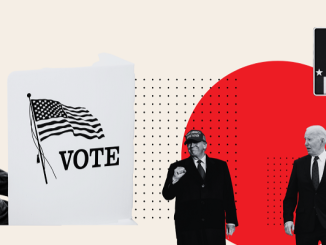By Astrid Galván, Axios

The fight is on to help Latino voters find credible information this election season amid surging concerns over the use of generative AI and deepfakes.
Why it matters: A record-high 36.2 million U.S. Latinos are eligible to vote this year, but many get their news from social media platforms like YouTube and WhatsApp, whereexperts saymisleading information in Spanish is less likely to be intercepted by moderators.
Details: The nonpartisan News Literacy Project later today is hosting a free, bilingual panel aimed at helping Latino voters find credible news sources.
- PolitiFact en Español, which is also nonpartisan, launched last year to tackle misinformation in political news.
- The campaign arm for the Congressional Hispanic Caucus, CHC BOLD PAC, recently launched what it’s calling “our lucha war room,” a campaign to respond to disinformation from conservative Republicans.
What they’re saying: Alex Mahadevan, director of Poynter Institute’s MediaWise, says the amount of misinformation and disinformation aimed at Spanish-speaking voters so far is about on par with the 2020 presidential election, but he worries about the use of AI to manipulate or create fake videos and audio this time around.
- “Disinformation” is the deliberate spread of false facts, usually with a political objective in mind; “misinformation,” on the other hand, may be unintentional.
- It’s not that there’s necessarily more misleading info aimed at Spanish speakers versus English speakers, but that the social media platforms most popular with Latinos are less likely to successfully weed out Spanish-language disinformation, Mahadevan says.
- He says finding the source of the bad information is challenging, but it often starts with something a national political figure says publicly that then spins out of control on social media.
- For example, there’s currently massive amounts of disinformation about immigration, including that terrorists are coming across the border or that newly-arrived migrants can easily access a green card, Mahadevan says.
Zoom in: Democrats have long sounded the alarm on Spanish-language disinformation.
- This year, the BOLD PAC campaign is targeting disinformation about reproductive rights and voter suppression tactics, and it’s going after congressional Republicans who take credit for bills they voted against, such as those that bring funding to their district, says the chairperson, U.S. Rep. Linda Sánchez (D-Calif.)
- “We really feel like we need a rapid response to respond to those false claims and that bad information,” Sánchez tells Axios Latino. “There are races all over the country where there are sizable Latino populations that can make the difference.”
Danielle Alvarez, a senior adviser with the Trump campaign, said Democrats’ efforts show they think poorly of Hispanics.
- “Their ‘disinformation’ campaign proves that they don’t believe we are able to discern fact from fiction — it is disgusting and condescending,” Alvarez said in an email to Axios Latino.
The big picture: Top tech and government leaders warn this election cycle could be upended by generative AI and deepfakes.
- In New Hampshire earlier this year, deepfake phone call using President Biden’s manipulated voice urged Democrats not to vote.
- Several states have introduced legislation to regulate AI, especially in regards to how it’s used to spread election misinformation.
A YouTube spokesperson said guidelines on misinformation apply to Spanish-language content and that the company regularly publishes data on videos removed for violating policies.
- The spokesperson adds that YouTube features content from reputable news outlets such as Noticias Telemundo and Univision in its recommendation and search results.
WhatsApp parent company Meta said its efforts to stem misinformation includes partnerships with four reputable news organizations certified to fact-check Spanish-language information, limiting forwarding messages to only five chats at once to limit viral messages, and labeling messages that have been forwarded many times.
- The app also bans mass messaging.
.
.




Be the first to comment